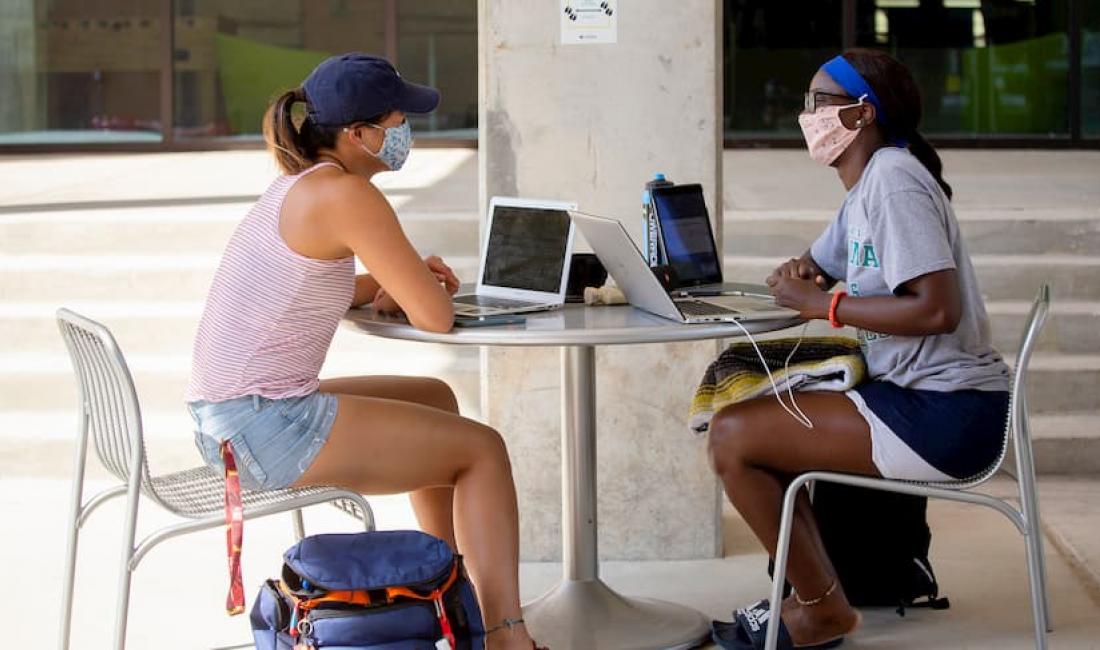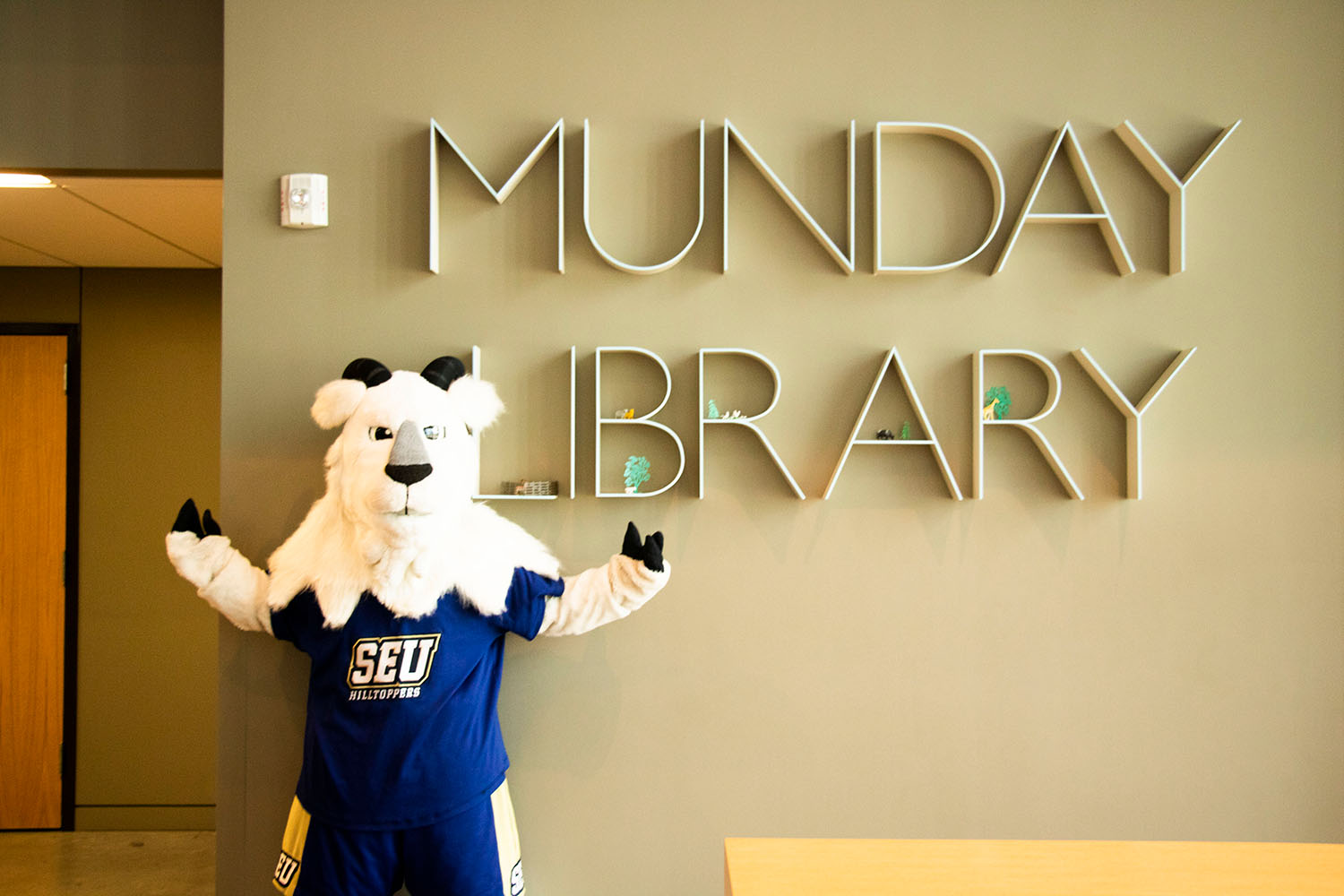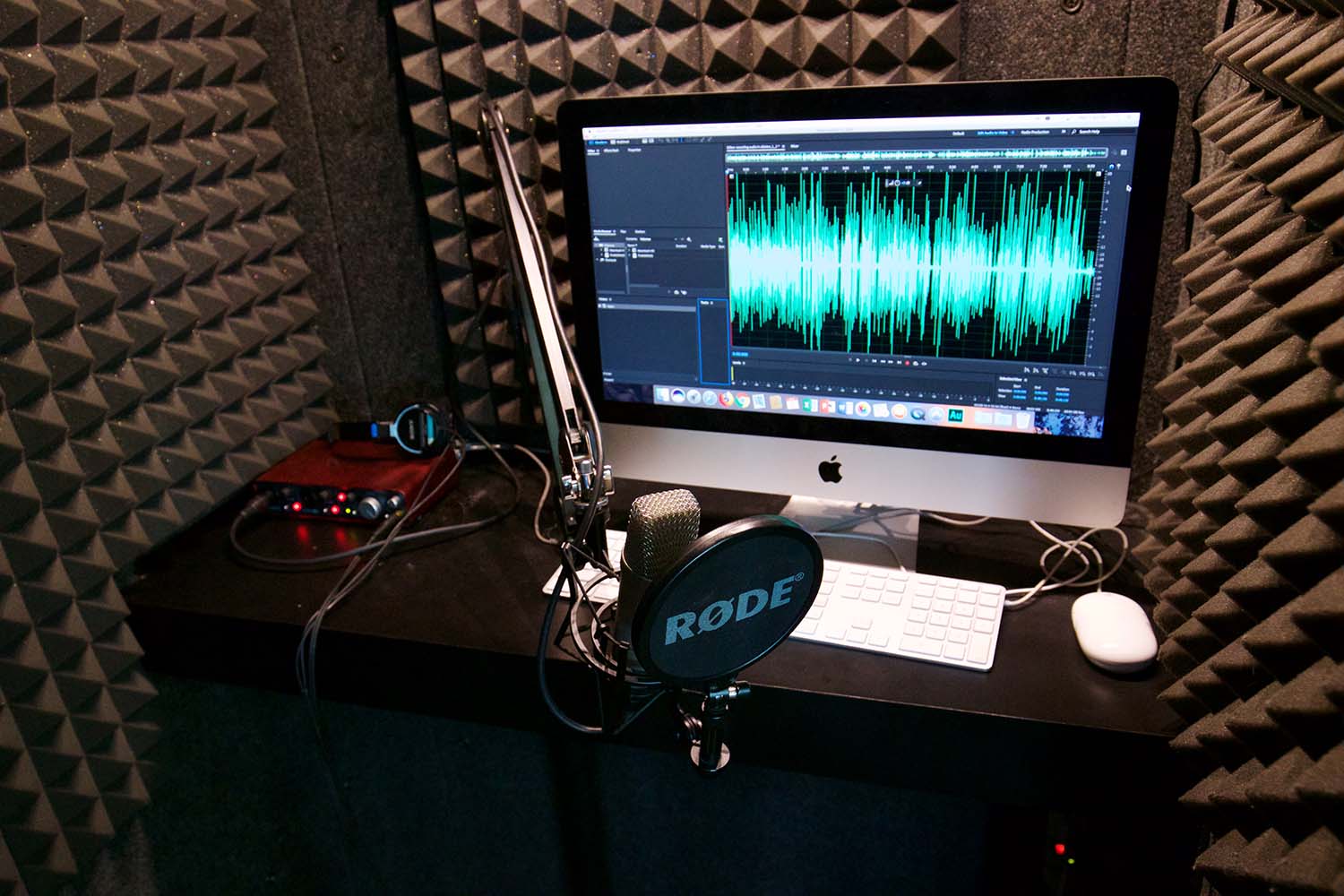Jan. 12, 2021
Well, we did it. We made it through 2020, a year that will be forever marked as a year of change.
Though a lot has changed to keep the St. Edward's community safe, OIT's commitment to championing campus vibrancy, supporting our community and keeping the Hilltop accessible has never wavered. Nobody knew what the future would hold, but we knew that the pandemic would create a learning, working and teaching experience that would rely on technology more than ever before. So, we got to work.
Our team worked to assess our resources and bridge the gaps in technology equity. To make remote operations more efficient and accessible, we sought feedback from our community; prioritized the health of our students, staff and faculty; updated our services and software to be more helpful and efficient; and reimagined our impact on campus vitality.
Support When You Need IT
One of OIT's main functions is, of course, support. Technology, like change, can be scary. It doesn't have to be, though. We are here to help you not only navigate the frustrating bits of technology but also to help you be your most productive self. When the pandemic hit, we had to prioritize our resources and the health of every member of our team. One step we took to begin this reprioritization was our transition to a virtual support model to mitigate any risk of exposure to COVID-19 for our student-staffed Help Desk.
The next step toward creating a better experience for our St. Edward's community was providing as many technology resources as we could in a short amount of time with a more limited amount of resources due to budget cuts. Sounds easy, right?

Thus, we began an overhaul of our knowledge base to meet our community's needs during the transition to remote learning and working. Part of this overhaul included highlighting our most relevant articles for distanced learning and working, such as Taking an Online Course and Working Remotely.
Still, not all university activities were virtual in Fall 2020. Some classes that required an in-person experience and depended on university equipment continued to meet on campus. Social distancing and other safety measures meant that campus learning spaces would need to support a quality experience for both on-campus and remote students. OIT equipped these spaces (including studio art, performance, and science lab environments) with iPads mounted on mobile, flexible stands. This solution allowed faculty to bring remote students into the on-campus experience via Zoom, capturing classroom activities from various vantage points and facilitating interaction between in-person and remote students.
When the university went remote, we were suddenly faced with a conundrum. Many, actually. Most students rely on software that is either unavailable on or untenable for personal computers and due to the lockdown, they wouldn't be able to walk into one of our computer labs when they needed to access that software. A communication major that can write all their papers in Word, Pages or Google Docs would probably be fine, but what about someone that needed to do complex data-crunching in ArcGIS? Or compile an app in Xcode when they don't own a Mac? To combat this looming access inequity, we worked with one of our existing services, LabStats, to create remote access portals for our lab computers. Now, we can offer computer labs over a remote connection, so students can access the resources they need, regardless of location or their own computing power.
Remote learning and working highlighted access to cloud services as a need. At St. Edward's, we use a lot. Think Google, Zoom, Canvas, Panopto… the list goes on. Even before the pandemic hit, when cloud service outages occurred, we prioritized letting the St. Edward's community know, and with haste. So, OIT developed a System Status page to provide links to the third-party vendors who monitor the status of our most-used cloud services. So, if you've ever wondered, "is it just me?" when Gmail seems slow, or if you get an error logging into Canvas, you can easily confirm with the service if it is, in fact, just you. Cloud-based services make it possible to work from anywhere at any time of day. Now, you can monitor these services in the same way. Alongside the development of this page, we made some changes to our existing catalog of cloud services for the university.
Cloud-Based Services
We decided a Zoom Pro account was a necessity for everyone as swiftly as we realized virtual operations would be the way of the foreseeable future. Accordingly, all St. Edward's staff, faculty and students now have access to a Zoom Pro account. In turn, we enabled Panopto and Canvas integration with Zoom to make videoconferencing as efficient as possible. We also piloted two services for anytime proctoring of online exams--Respondus and Honorlock--and ultimately chose Honorlock because of improved functionality, 24/7 direct support for both students and faculty, and it’s live pop-in proctor feature.
This year, St. Edward's also acquired Adobe Sign Enterprise (yes, another cloud-based service) to allow the user to send, sign, track and manage signature processes using a browser or mobile device. Adobe Sign is not only convenient, it also helps aid remote work as operations continue at St. Edward's. In addition, all St. Edward's students and employees have access to Adobe Creative Cloud on any classroom or lab computer.

Munday Library Joins OIT
Munday Library's culture of creativity and collaboration has found a new home within OIT. Since July, many new partnerships and resources within OIT have supported the library's efforts to improve in-person and online service during the pandemic, and improve the efficiency of many behind-the-scenes processes.
Notwithstanding the support of its new network, it was a difficult year for the Library. Use of the print collection formerly housed on the second floor had declined precipitously for many years prior to the spring of 2020. In consideration of these changes to the community's research practices, the considerable cost to curate and circulate the collections, and innovative new ideas about the Library as a collaborative space, the Library’s print collections were discontinued over the summer.
However, the convenience, flexibility, and equitable access afforded by the Library's longstanding emphasis on digital resources have served well since the university transitioned to remote and blended learning last spring. The Library has significantly expanded its collection of databases, ebooks, and streaming videos since then.
Feedback & Community Support
Feedback from our community has been invaluable in guiding OIT’s reaction to the pandemic. We are fortunate to have long standing groups--our OIT Student Advisory Committee and the Teaching, Learning, and Technology Roundtable (TLTR)-- who have provided us with ongoing feedback as we adjust our services to the pandemic. In addition, OIT staff served on many of the university’s COVID-19 working groups, and opened lines of communication with department chairs and other stakeholders. We worked to provide technology to support remote and socially-distanced learning and benefitted from input gathered via Workplace and other social media channels.
In Fall 2020, TLTR awarded Technology for Innovative Learning & Teaching Pilot Project Grants to support projects that support online teaching and learning or socially-distanced teaching and learning. These projects explore ways to use digital tools as an alternative experiential learning experience, such as the Visible Body courseware used to study anatomy seen at the right, or virtual reality simulations. Others explore the use of video to support teaching improvement, software for modeling complex dynamical systems, and methods for adapting online textbooks to local contexts, which will provide lessons for instructors making use of free digital textbooks and other open educational resources (OERs). This announcement combines the results of two CFPs, one in Spring 2020 and one in Fall 2020. To learn more about the projects, visit the TLTR website.
"Technology, like change, can be scary. It doesn't have to be, though."

Connection Through Media
We also brought you more ways to get to connect with us on a more personal level. In December 2020, we unveiled our latest project, #AskOIT: The Podcast. It's the same tech advice you know and love, just with a more personal touch. As we said, technology can be scary. There's always some new gadget or app. Even if you have your trusted set of tools, it feels like software gets updated every time you blink. And everything — everything! — is a series of acronyms. That's why we're here: to offer solutions to the technology questions you've been too scared to ask about software, hardware, wearables, robots... you name it! You can send us your anonymous questions, and OIT's Yasmeen Yahya and Jesse Plaza will hound our in-house experts to get the details.
We also brought back #TechTipTuesday on our social platforms, Twitter, Workplace and Instagram, to bring you small doses of helpful tips to be your most productive self. We take the granularity out of tech and leave all the cool stuff.
Sometimes we'll explain tech terms, such as what even is "the cloud"? Sometimes, we'll help you navigate new tech so you can be empowered to take a course of action that makes the most sense for you. The possibilities are endless because the vast knowledge within the world of technology is endless.
Of course, we can't forget that events look and feel different. Like many citizens, friends and innovators of Austin, the live music capital of the world, we have had to adapt to keep our community safe while supporting the artists who cultivate Austin's world-renowned vibrant culture. The @Jones concert series sponsored by OIT and the Mary Moody Northen Theatre has adapted to become a virtual experience that can be enjoyed from anywhere. We invited artists such as Guy Forsyth and Los Texmaniacs featuring Flaco Jimenez to bring back music and fun to the (virtual) Hilltop. These experiences remind us how important connection, art and fun are to the St. Edward's University experience. Simply put, we miss doing stuff with other people in the same room.
Forward Thinking
As much as it is important to take time to reflect, it is also just as important to look ahead to new and exciting experiences.
In the new year, the library is looking forward to increasing its staff's size, expanding onsite and online services, and acquiring targeted and in-demand print resources that are unavailable digitally. Furthermore, Munday Library is thrilled to be a part of the Learning Commons Task Force and to be working with the Faculty Senate Library Task Force to find dynamic new ways to serve the students, faculty and staff of St. Edward's University.
Homecoming 2021 is set to be done like never before. To support recommended social distancing guidelines, St. Edward's Homecoming will rely more on virtual engagement with our community. Though there will not be as many on-campus events this year, the university has the opportunity to connect in more ways than ever before with Hilltoppers all over the world. Events that have been traditionally restricted to the confines of our campus are now more open to participation because of its virtual nature. Though Homecoming will be different in many ways, one of the greatest silver linings is the ability to connect in new ways.
As previously mentioned, OIT did an overhaul of our resources to make them more relevant to remote operations during the COVID-19 pandemic. This marked a momentous change in the content we provide and the way we support the university. These changes will continue as we are constantly evolving to meet our community's needs. We can continue to evolve and grow as an organization through feedback provided by our community. Please consider joining TLTR or the Student Advisory Committee in the Spring 2021 semester to help shape the future of St. Edward’s University.
We are working to provide even more resources for our community, such as more tech guides, library resources and an updated user experience for our Support page, support.stedwards.edu. As our global, national and local situations fluctuate, we will adapt to provide the best experience we can given the circumstances. We are hopeful these turbulent and unprecedented waves of change will make for a more resilient, connected university experience.
